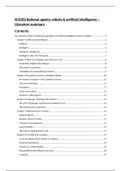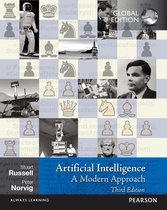0LSUE0 Rational agents: robots & artificial intelligence –
Literature summary
Contents
Can machines think? Fundamental problems of artificial intelligence (Vincent Müller)........................4
Chapter 3 Artificial and Intelligent.....................................................................................................4
Artificial..........................................................................................................................................4
Intelligent.......................................................................................................................................4
Testing for intelligence..................................................................................................................4
Intelligence after the Turing test....................................................................................................7
Chapter 4 What is a Computer and what can it do?..........................................................................8
Computing: Digital and Analogue..................................................................................................8
The universal computer.................................................................................................................8
Tractability of computational problems.........................................................................................9
Chapter 5 Perception & Action; Intelligent Bodies..........................................................................10
Are human computers? AI & Cognitive Science...........................................................................10
The role of the Body....................................................................................................................11
Perception...................................................................................................................................11
Action and control.......................................................................................................................12
Summary: reflex agents...............................................................................................................12
Chapter 6 Language, Meaning and Intention...................................................................................13
The role of language, meaning and intention for AI....................................................................13
The Chinese room argument.......................................................................................................13
Chapter 7 Rational Choice & Action.................................................................................................15
Rational Agents............................................................................................................................15
Decision Theory & Utility.............................................................................................................15
Criticism & Developments...........................................................................................................16
Expert systems.............................................................................................................................16
The role for rational choice in AI..................................................................................................17
Chapter 8 Free Will and Creativity...................................................................................................17
To do as I please (and to please as I please)................................................................................17
Empirical illustrations..................................................................................................................18
Freedom vs. Determination.........................................................................................................18
Responsibility and Reflection on Goals........................................................................................18
Creativity......................................................................................................................................19
, Chapter 9 Feelings and Conscious Experience.................................................................................19
Exposition: Awareness & Experience...........................................................................................19
Clarifying experiments: Mary, Bats, Blindsight............................................................................19
Conscious Qualities as “Mind-Dependent”..................................................................................20
Mind and Matter..........................................................................................................................20
The Self & Awareness..................................................................................................................20
Consciousness and Computation.................................................................................................20
Artificial intelligence: a modern approach (Russel & Norvig)..............................................................21
Part 1 Artificial Intelligence..............................................................................................................21
Chapter 1 Introduction................................................................................................................21
Chapter 2 Intelligent Agents........................................................................................................30
Part 2 Intelligent Agents..................................................................................................................34
Chapter 3 Solving Problems by Searching....................................................................................34
Part 3 Knowledge, reasoning, and planning.....................................................................................40
Chapter 7 Logical agents..............................................................................................................40
Part 4 Uncertain knowledge and reasoning.....................................................................................46
Chapter 13 Quantifying uncertainty............................................................................................46
Chapter 14 Probabilistic reasoning..............................................................................................50
Chapter 16 Making Simple Decisions...........................................................................................51
Part 5 Learning.................................................................................................................................55
Chapter 18 Learning from Examples............................................................................................55
Part 6 Communicating, perceiving, and acting.................................................................................58
Chapter 25 Robotics.....................................................................................................................58
Minds, brains, and programs (Searle)..................................................................................................61
Will AI Achieve Consciousness? Wrong Question (Dennett, Wired, 2019)..........................................62
Free will (Strawson, Galen, 2004)........................................................................................................62
1. Compatibilism..............................................................................................................................62
2. Incompatibilism...........................................................................................................................63
3. Pessimism....................................................................................................................................63
4. Moral responsibility.....................................................................................................................63
5. Metaphysics and moral psychology.............................................................................................63
6. Challenges to pessimism..............................................................................................................64
A Tutorial Introduction to Decision Theory (Warner North, 1968)......................................................64
Utility theory....................................................................................................................................64
Probability theory............................................................................................................................65
Computing machinery and intelligence (Turing, 1950)........................................................................65
, The imitation game..........................................................................................................................65
Critique of the new problem............................................................................................................65
The machines concerned in the game.............................................................................................66
Digital computers.............................................................................................................................66
Universality of digital computers.....................................................................................................66
Contrary views on the main question..............................................................................................67
Learning machines...........................................................................................................................68
The Ethics of Artificial Intelligence (Bostrom, 2011)............................................................................68
Ethics in Machine Learning and Other Domain-Specific AI algorithms............................................68
Artificial General Intelligence (AGI).................................................................................................69
Machines with moral status.............................................................................................................69
Minds with exotic properties...........................................................................................................70
Superintelligence.............................................................................................................................70
,Can machines think? Fundamental problems of artificial
intelligence (Vincent Müller)
Chapter 3 Artificial and Intelligent
This chapter considers definitions of “artificial” and “intelligence”. Furthermore it looks at the aims
of an AI.
Artificial
Definitions:
- Everything non-natural
- Created by humans in a non-biological fashion (artefacts)
Artefacts have been created in all ages using the newest techniques of these ages
- E.g. using cogs and wheels or steam and hydraulics or electrical relays
- Until computing machines were used for the first time in the 1940s, which indicated the
possibility of AI for the first time
Lead to the question by Turing in 1950: can be machines think
- This question was caused by the development of computing machines and the idea that
human thinking might be based on computations
In 1956, this all led to the new discipline of Artificial Intelligence.
Intelligent
Intelligence is a difficult concept to grasp or define.
Some aspects of intelligence:
- Intelligence entails acting on the environment to contribute to a goal
- Intelligence is higher if:
o The contribution of actions to the goal is larger
o The agent is aware of the goal / has knowledge of it
o Information processing about the environment is faster (processing speed)
o The behavior towards the goal is flexible/ adaptable, and therefore more robust
(performs well still in slightly different situations)
- One can also look at the underlying abilities, required for actions
o One is more intelligent, when it aims to perform the action (chooses to do so)
o It makes the difference between being intelligent, and behaving (as if you are)
intelligent
Briefly, intelligence can thus be described as the ability to enable actions contributing to achieving a
goal.
Testing for intelligence
The question “Can machines think?” (Turing, 1950) requires interpretations of the concepts of
“thinking” and “machines”. Turing thinks there are no definitions for these concepts, and therefore a
test (the Turing test) should be used to judge intelligent of machines.
Turing test (imitation game):
- A human and a machine should be judged by another human (interrogator)
, - The interrogator has to find out which is the machine and which is the human using
questions in a chat
- When the interrogator sees no difference between the human and machine (has to guess
randomly), the machine is intelligent
- Simplified version: no second human, only the interrogator and the machine where the
interrogator has to judge whether he is chatting with a human or a machine
Turing thought too optimistically about the improvements of the performance of machines in the
future.
There are several objections to the imitation game that are proposed by Turing himself, as of why
machines would never be able to pass the test.
The Turing test obviously only relates to the intellectual capacities of machines, and disregards
physical capacities.
We will look further into the Turing test with regard to AI.
Is the passing of the test necessary? (objections + counterarguments)
- There may be intelligent beings unable to pass the test (Chimpanzee objection)
o The test is useful to identify systems that are indeed intelligent, and not exclude the
systems that do not pass it is not a condition for intelligence
- Only machines that have human intelligence or perfectly simulate human intelligence can
pass, different intelligence stands no chance
o It does not really matter, because we still have an intelligent system in that case, just
not passing the imitation game
- Defender of the test: the test provides us with the only meaningful characterization of
intelligence if not using the Turing test, how to test or define it?
- Possibly, human intelligence and human life are so close together that artificial agents can
never pass the Turing test
o Intelligence is required in humans for both lower and higher (cognitive) functions
Is passing sufficient?
- Can the test be cheated on?
o Is the simulation of intelligence (“cheating”) already intelligent in itself?
Dennet and Hofstadter: some abilities are impossible to simulate without
actually “performing”/ showing the ability. This is also the case with
intelligence, and therefore passing the Turing test always shows intelligence.
Shieber: passing does not theoretically prove intelligence, but it does give
practical proof (thus it is not the same in theory)
Conclusion by Müller: simulation does not show intelligence in itself
automatically, but it might be difficult (if not impossible) to build a machine
that can cheat, but is not intelligent
o Is it possible to cheat well without having intelligence?
Conceptual impossibility: intelligence is a mental ability that allows
behaviors, while the Turing test measures behaviors solely (is there a
difference)
Practical impossibility: is it possible to create a system that behaves
intelligent without being intelligent (cheating without intelligence)






